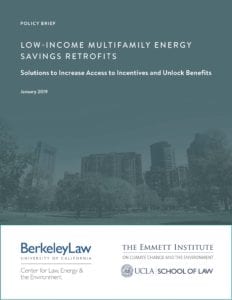Register For June 20th Webinar On Increasing Energy Retrofits For Low-income Multifamily Properties
Expert panel with Energy Commissioner Andrew McAllister will discuss forthcoming Berkeley Law/UCLA Law report
California will need to double the energy efficiency of existing buildings by 2030 in order to achieve the goal of reducing greenhouse gas emissions 40 percent below 1990 levels by that year. While state leaders have adopted aggressive standards for efficiency in appliances and new construction, convincing property owners to undertake retrofits to improve energy performance, from switching out incandescent light bulbs to LEDs to installing energy efficient windows and wall insulation, is a tough task. It’s made even more challenging for low-income residents of multifamily buildings who may not own their units or building common spaces or otherwise lack the fiscal incentives and means to pay for this work.
To address the challenge, the Center for Law, Energy & the Environment (CLEE) at Berkeley Law and UCLA School of Law’s Emmett Institute on Climate Change and the Environment will soon launch a new report, Low Income, High Efficiency (we released a policy brief with some of the top-level findings earlier this year). On Thursday, June 20 at 10am, the law schools will host a free webinar to discuss the report’s recommendations for improving low-income multifamily energy efficiency incentives, with experts including:
- California Energy Commissioner Andrew McAllister
- Peter Armstrong of Wakeland Housing
- Martha Campbell of the Rocky Mountain Institute
 The new report, co-authored by CLEE and the Emmett Institute and sponsored by Bank of America, is based on two stakeholder convenings organized to identify solutions to the cost and complexity of efficiency retrofits in the low-income multifamily sector. These buildings face limited access to capital, complex financing arrangements and restrictions, and competing renovation needs. California’s energy regulators and electric utilities operate a number of incentive and rebate programs, but strict income qualification criteria, program complexity, and a lack of adequate energy data can limit uptake.
The new report, co-authored by CLEE and the Emmett Institute and sponsored by Bank of America, is based on two stakeholder convenings organized to identify solutions to the cost and complexity of efficiency retrofits in the low-income multifamily sector. These buildings face limited access to capital, complex financing arrangements and restrictions, and competing renovation needs. California’s energy regulators and electric utilities operate a number of incentive and rebate programs, but strict income qualification criteria, program complexity, and a lack of adequate energy data can limit uptake.
As described in our policy brief this year, the report will offer a range of solutions to increase access to energy efficiency incentives and unlock environmental, financial, and quality-of-life benefits for owners and residents alike, including:
- Creating a single, statewide “one-stop shop” efficiency program administrator to comprehensively manage incentives and offer users a single point of access.
- Expanding innovative financing mechanisms such as “pay as you save” and third-party “energy budget” arrangements that take advantage of residents’ utility bills and private capital.
- Creating a comprehensive database to help prioritize retrofit projects and support energy data benchmarking and analysis efforts.
Please join us for the free webinar and report release on Thursday, June 20 to discuss these solutions and more.
You can RSVP here. We’ll blog again that week once the full report is publicly available.






Reader Comments